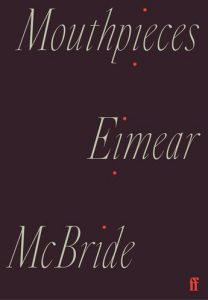 We are delighted to announce that Eimear McBride’s three short, characteristically powerful and disorientating texts depicting a fragmentary female experience, has been published in one collection, Mouthpieces, earlier this month. These works were composed during her time as Inaugural Creative Fellow at the Samuel Beckett Research Centre in 2017-2018 with unique access to the Beckett Archives at the University of Reading.
We are delighted to announce that Eimear McBride’s three short, characteristically powerful and disorientating texts depicting a fragmentary female experience, has been published in one collection, Mouthpieces, earlier this month. These works were composed during her time as Inaugural Creative Fellow at the Samuel Beckett Research Centre in 2017-2018 with unique access to the Beckett Archives at the University of Reading.
McBride’s last three novels – A Girl Is A Half-Formed Thing, The Lesser Bohemians and Strange Hotel – combines an innovative, affective style that expresses the inexpressibility of trauma and grief. In Mouthpieces, each short piece creates a dramatic space that is no less intense because of its brevity,
These are powerful, disorientating works that benefit from the fact that the reader can loop back round and re-read each of them immediately (Kelly, 2 February 2021).
In the first of the short pieces, ‘The Adminicle Exists’, we hear the inner voice of a woman who intervenes to save her troubled partner. This monologue for a female voice reveals to the reader the claustrophobic atmosphere of the facility where her partner will remain until he is “tidied back up,” as well the disgust, frustration and compassion that she feels at the situation. There is a rupture at the end of this piece where the undercurrent of fear bursts to the surface: fear of violence, fear for the speaker’s life. In ‘An Act of Violence’, fear is transformed into dismissiveness as remnants of Beckett’s themes of interrogation and power emerge. E, a woman, is questioned by A, an offstage, genderless voice, regarding an incident with a knife. E’s voice is unrelenting in its desire to know the truth of the incident, and to force A to accept their interpretation. However, the tremulous power balance of A and E undermines any definitive narrative of the event, or its truth. Finally, in ‘The Eye Machine’ the character ‘Eye’ tells of her imprisonment, flickering through a slideshow of female stereotypes. This an uncomfortable entrapment for the reader into a world where misogyny cannot be ignored or dismissed,
“If there was no everything only this things and that was all things. If she thought like that. If she thought that. If there was no getting to. If there was only is. If is, is the thing she liked to think except there is no like and there is no think, there is only is. There is no only. There is, is. Is, is all there is?” The effect is of a misogyny which in not intermittent or an exception, but an awful always (Kelly, 2 February 2021).
McBride’s short pieces are dramatic texts written in an original, sharp and innovative style that is unapologetic in its representation of the troubling, heart wrenching and traumatic aspects of the female experience. In many ways, Beckett’s Not I is perhaps most prevalent in Mouthpieces which McBride has noted in her ‘Reflections on Samuel Beckett’:
At any rate, after some suffering, much cursing and endless deleting, three short pieces emerged: two performance and one prose/performance. Not plays, definitely not plays, but also not stories, or not in the usual sense. I can’t pin them to a single work of Beckett’s, but an influential contender is certainly, almost inevitably, Not I. However, only in so far as this is where Beckett cleared space for the female voice, unhindered by psychology, sociology, physicality or even history to surge through. So, in line with my evolving practice of appropriating what I admire in other writers’ work – Sarah Kane’s unapologetic confrontationalism for A Girl is a Half-formed Thing, Dostoyevsky’s epic, tragic monologues for The Lesser Bohemians – this is what I stole from Beckett: the stripping away of all justification to reveal a deeper truth. I hope the pieces will succeed on their own terms, of course, but if not, we all know what the man himself has to say about that (McBride).
Mouthpieces by Eimear McBride is published by Faber & Faber and is available now (ISBN 9780571365814). You can listen to McBride read extracts from Mouthpieces, and read her ‘Reflections on Samuel Beckett’ here.
References
Kelly, Stuart. ‘Book Review: Mouthpieces, by Eimear McBride’ in The Scotsman (2 February 2021). https://www.scotsman.com/arts-and-culture/books/book-review-mouthpieces-eimear-mcbride-3121472
McBride, Eimear. ‘Reflections on Beckett’ https://samuelbeckettcentre.weebly.com/blog/eimear-mcbrides-evolving-relationship-with-becketts-work

